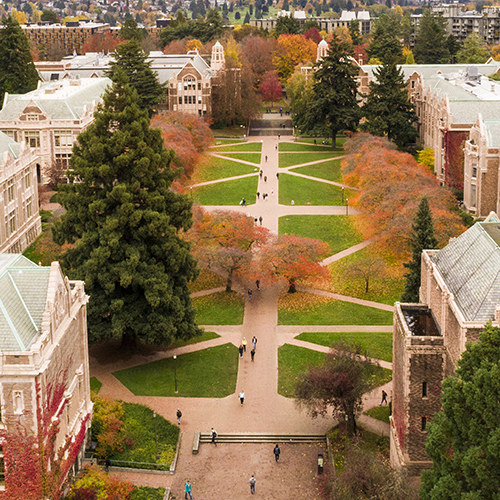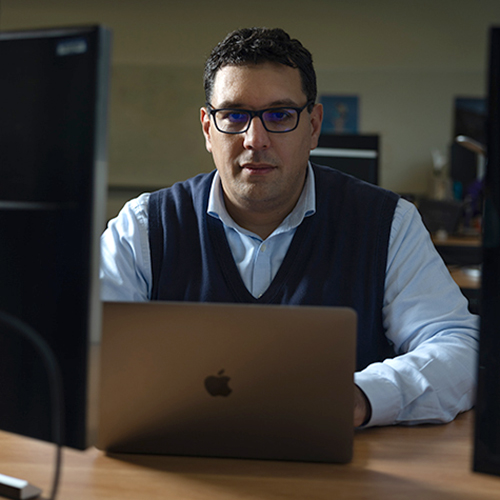For more than three decades, P. Dee Boersma has studied and advocated for penguins in South America, particularly Magellanic penguins in Argentina. Through research, conservation, and outreach, she has educated the public and government officials on the need to conserve and protect penguin habitat and feeding grounds and view these birds as key indicators of ocean health.
Now Boersma, UW professor of biology and Wadsworth Endowed Chair in Conservation Science, is one of six finalists for the prestigious Indianapolis Prize — the highest honor for animal conservationists. Boersma is the first UW faculty member nominated for this prize, which has been awarded every other year since 2006.
Ground zero for Boersma’s work is Punta Tombo, Argentina. This stretch of Argentine coast is home to about half a million Magellanic penguins, the largest nesting site in the world for this species. Today, in addition to the birds, Punta Tombo is crawling with scientists from the Center for Penguins as Ocean Sentinels — which Boersma founded — and 100,000 visitors a year snapping photographs.

When Boersma first arrived in Punta Tombo in 1982, the picture was quite different. Back then, a military junta ruled Argentina and a Japanese company was proposing to harvest the penguins for oil, protein, and hides for industrial applications. “They wanted to turn them into high-fashion golf gloves,” said Boersma. “But the Wildlife Conservation Society joined forces with Argentine tourism officials in an initial push to find out how many penguins there were at Punta Tombo.”
Boersma began an initial survey of the Magellanic penguins at Punta Tombo, which soon blossomed into a large-scale census of penguin biology and behavior spanning nearly 35 years. Boersma and her colleagues have catalogued courtship, mating, parental, and feeding habits over that period, gathering valuable information about how these birds live their lives on land and at sea.
I think what we’ve done at Punta Tombo is show people what the penguins need and why we must help them.
“I find them endlessly fascinating,” said Boersma. “They can live for decades and form monogamous bonds that last for years — or sometimes a pair will ‘divorce’ and each go find a new partner. They’re amazing athletes and can swim over 100 miles a day to find food to feed their chicks.”
Boersma’s research and public engagement efforts saved the penguins of Punta Tombo from a grisly fate and also increased public interest in penguin preservation. With collaborators and colleagues at the Global Penguin Society, she has steered government policies toward preservation of penguin nesting sites and feeding grounds. In 1997, she got oil tankers diverted 25 miles farther off the Patagonian shore, saving tens of thousands of penguins from an oily grave.
In 2007, Boersma and her colleagues stopped construction of a cement trail through Punta Tombo, where hundreds of penguin chicks were about to hatch. Last year, the government of Argentina’s Chubut Province created a preserve at Punta Tombo to keep developers away from the penguin nesting sites. More than 100,000 visitors each year now come to Punta Tombo to view the penguins that were once eyed for golf gloves.

“The research is what really pushes these policy decisions,” said Boersma. “Science can set boundaries for what policy decisions are most effective. I think what we’ve done at Punta Tombo is show people what the penguins need and why we must help them.”
“Our world is unquestionably better off because of heroes like Dr. Dee Boersma," says Michael Crowther, president and CEO of the Indianapolis Zoological Society, which administers the Indianapolis Prize, "and we hope others will not only take notice of, but also join in her noble work to save wild things and wild places.”
Boersma and the other five finalists for the prize will each receive $10,000. The winner will be announced this spring and receive $250,000 and a medal later this year.
In the meantime, Boersma is not resting on her laurels. She is currently in the Galapagos Islands, studying the effects of El Niño on penguin populations.
More Stories

A Nobel, an Inventor, a Polymath & More
Recent awards and appointments celebrate Arts & Sciences faculty and staff for their research, leadership, and more.

Democracy by the Numbers
Mathematics and Democracy, an undergraduate mathematics course, explores the role of math in many aspects of democracy, from elections to proportional representation.

A Statistician Weighs in on AI
Statistics professor Zaid Harchaoui, working at the intersection of statistics and computing, explores what AI models do well, where they fall short, and why.